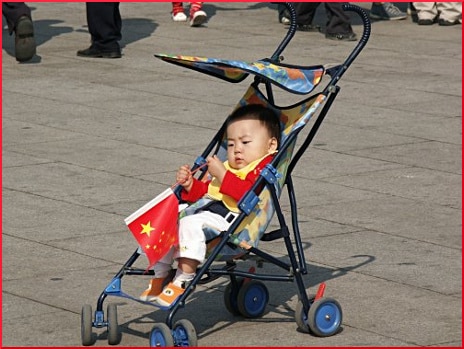
China’s One Child Policy was introduced in 1979, technically applying only to ethnic Han Chinese, and with a gradually-increasing number of exceptions permitted. The government decided that making women give birth without anesthetic would encourage compliance, because who wants to go through that twice?
The carrot-and-stick approach included both incentives for people who obeyed the law, and punishments for those who did not, including forced sterilizations and late-term abortions. A couple of years ago, the law was changed to allow two children.
Are Chinese singletons obese?
A study of the influence of China’s one-child policy, by researchers from four universities, was released recently. Its conclusions are summarized by these points:
Being single-child was associated with high risk of childhood obesity.
Single-child status and childhood obesity association became stronger over time in China.
Single urban children were more likely to have excess energy intake than those with siblings.
The obesity trend was exacerbated by other cultural factors, like a suspicion toward fresh groceries that lingered for a while after a series of contamination scandals and scares. Despite being laced with sugar, salt, and chemicals, processed food items were perceived as more healthful.
As the country’s prosperity increased, people shunned the traditional bicycles for cars, and burned fewer calories. Rather than doing farm work, millions of Chinese found themselves sitting at desks to earn their livings. When families were forced to limit the number of progeny, attention became focused on a limited pool of children eligible for spoiling, and a sort of competition took place among relatives to see who could most successfully fatten up a lone child.
Are obese Chinese kids miserable?
That depends on how you define misery. Millions of kids have enjoyed sumptuous early childhoods of being treated like “little emperors,” overfed by both their parents and grandparents, showered with gifts of computers, play stations, and other gadgets that foster a sedentary existence.
Inevitably, it all caught up. “Internet addiction” became a genuine concern, as grownups blamed online gaming for the extra pounds the kids became encased in. This resulted in the establishment of harshly administered “fat camps” and of specialized institutions for treating internet addiction with methods as extreme as electric shock.
Despite the fact that many concerned parents made efforts to encourage contact with other children, the outcome of the One Child Policy was found to be negative by a 2013 study by researchers from three universities:
Results indicated that individuals who grew up as single children as a result of China’s OCP were significantly less trusting, less trustworthy, more risk-averse, less competitive, more pessimistic, and less conscientious individuals.
Those qualities seem destined to create a life experience which, while it may not reach the “misery” benchmark, is nonetheless unhappy.
Hong Kong footnote
In 1997 Hong Kong became one of China’s Special Administrative Regions. Although it was exempt from the One Child Policy, Hong Kong faces its own obesity epidemic. Presently, about 40% of adults are overweight or obese, along with about 20% of the school-age kids, and this is definitely considered a public health problem.
Your responses and feedback are welcome!
Source: “9 things you didn’t know about China’s One Child Policy,” Sbs.com.au, 08/17/16
Source: “Are single children more likely to be overweight or obese than those with siblings?,” ScienceDirect.com, 07/21/17
Source: “China confronts problem of obesity,” Independent.co.uk, 01/01/13
Source: “Effects of China’s One Child Policy on its children,” ScienceDaily.com, 01/10/13
Source: “Quality of life in overweight and obese young Chinese children,” BioMedCentral.com, 03/06/13
Photo credit: robot42 via Visualhunt/CC BY-SA

 FAQs and Media Requests:
FAQs and Media Requests: 











